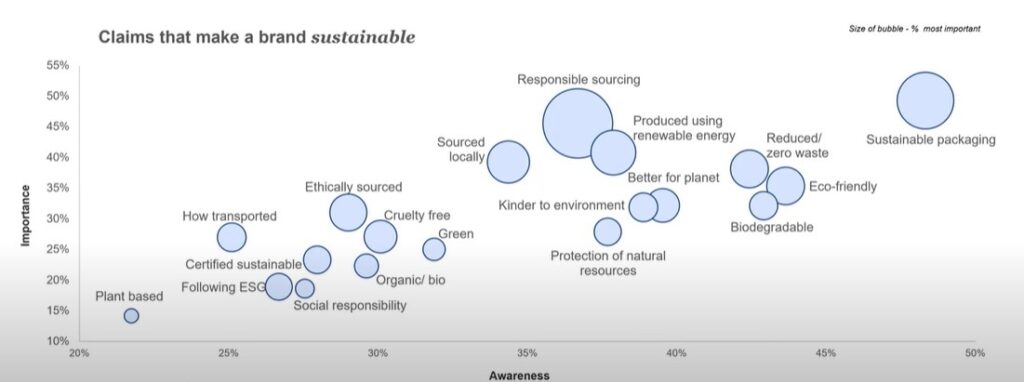In a world increasingly aware of environmental issues, corporate sustainability has become a priority for both companies and consumers. However, is there a disconnect between what companies consider sustainable practices and what consumers value? A recent visual analysis provides a clear and revealing perspective.
The term “eco-friendly” also resonates strongly. Sustainable packaging has emerged as the most important aspect recognized by consumers. Nearly 50% of respondents consider it crucial, and approximately 45% are aware of its relevance. Growing concern over excessive plastic and non-recyclable materials has driven consumers to prefer products with environmentally friendly packaging, making it the most prominent claim in terms of sustainability.
Consumers are looking for products and brands that minimize their environmental impact through sustainable and eco-friendly practices, showing a clear interest in reducing environmental damage. Waste minimization is another crucial factor in consumers’ minds. Waste reduction or elimination is valued by 45% of respondents and recognized by 40%. Companies that implement zero waste and waste reduction policies win the approval of conscious consumers looking to minimize their environmental footprint.
The use of renewable energy in production processes also ranks high on consumers’ list of priorities. With 40% importance and 35% recognition, the use of renewable energy not only reduces a company’s carbon footprint but is also highly valued by consumers. This reflects a clear desire to support companies that embrace cleaner, more sustainable energy sources.
Responsible sourcing of natural materials and resources ensures that a company’s practices do not contribute to environmental exploitation or degradation. This aspect is valued by 40% of consumers and recognized by 35%, underlining the importance of ethical and sustainable sourcing practices.
What makes a brand sustainable?

Although less recognized, factors such as biodegradability and the protection of natural resources are also crucial. Biodegradability implies the use of materials that can decompose naturally, reducing long-term environmental impact. Natural resource protection refers to practices that ensure the preservation and non-depletion of vital resources.
To close the gap between business perceptions and consumer expectations, it is crucial that companies not only implement these practices, but also effectively communicate their sustainability efforts and achievements. Transparency and education are key to aligning expectations and building a relationship of trust with consumers.
In an increasingly environmentally conscious marketplace, companies that prioritize and demonstrate their commitment to sustainability will not only contribute to a healthier planet but will also earn the loyalty and respect of their customers. This commitment is not only good for the environment, but also for business, creating a virtuous cycle of sustainability and business success.
For more information click HERE to see our blog on Agenda 2030 and the importance of sustainability.




